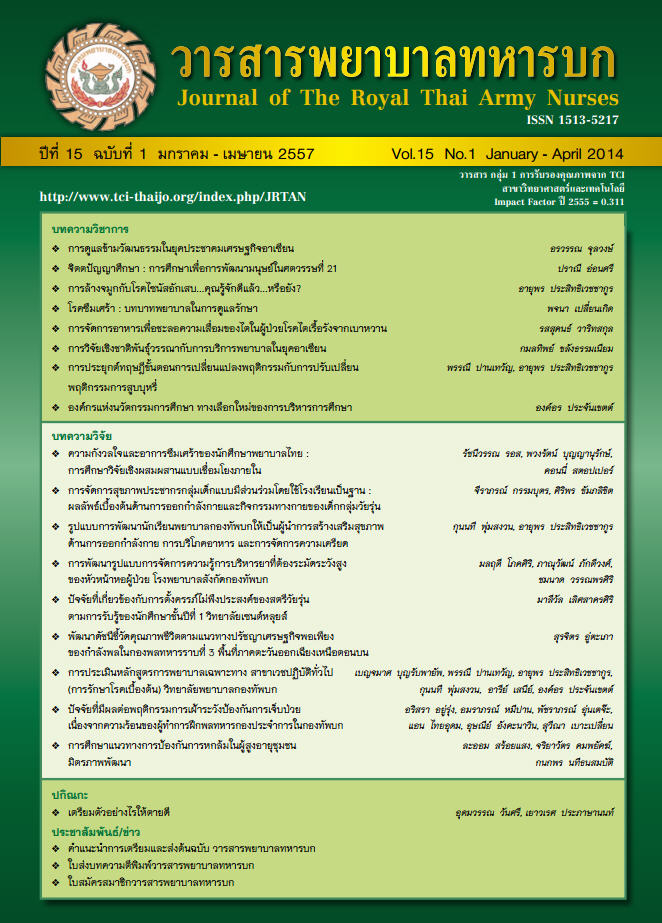ปัจจัยที่มีผลต่อพฤติกรรมการเฝ้าระวังป้องกันการเจ็บป่วยเนื่องจากความร้อนของผู้ทำการฝึกพลทหารกองประจำการในกองทัพบก Factors Affected to Behaviors of Thai Army Trainers in Monitoring and Preventing Heat Related Illness among Privates Trained in the Royal Thai
Keywords:
การเจ็บป่วยเนื่องจากความร้อน, พฤติกรรมการเฝ้าระวังป้องกันการเจ็บป่วยเนื่องจากความร้อน, ผู้ทำการฝึกพลทหารกองประจำการในกองทัพบก, Heat Related Illness, HRI Preventing Behaviors, Royal Thai Army Private TrainersAbstract
การวิจัยครั้งนี้มีวัตถุประสงค์เพื่อศึกษาความสัมพันธ์ และปัจจัยที่ใช้ในการทำนายพฤติกรรมการเฝ้าระวังป้องกันการเจ็บป่วยเนื่องจากความร้อนของผู้ทำการฝึกพลทหารกองประจำการในกองทัพบกระหว่างตัวแปร ประกอบด้วยปัจจัยส่วนบุคคล (ระดับการศึกษา อายุ ระดับชั้นยศ ประสบการณ์ของผู้ทำการฝึก) การสนับสนุนของหน่วยงาน ความรู้ ทัศนคติ และพฤติกรรม การเฝ้าระวังป้องกันการเจ็บป่วยเนื่องจากความร้อนของผู้ทำการฝึกในกองทัพบก เครื่องมือที่ใช้ในการวิจัยคือแบบสอบถามที่คณะผู้วิจัยสร้างขึ้นตามกรอบแนวคิดในการวิจัยแบ่งเป็น 6 ส่วน มีค่าความเชื่อมั่น .809 กลุ่มตัวอย่างคือ ผู้ทำการฝึกพลทหารกองประจำการในกองทัพบก 4 กองทัพภาค (ยกเว้นกรุงเทพมหานคร) ในผลัด 2 ประจำปี 2555 ใช้วิธีการเลือกกลุ่มตัวอย่างแบบแบ่งชั้นเป็นสัดส่วนตามภาค หน่วย และชั้นยศ ตามตารางสำเร็จรูปของ Taro Yamane ได้กลุ่มตัวอย่าง 391 คน เก็บข้อมูลระหว่างธันวาคม 2555 - กุมภาพันธ์ 2556 ผลการวิจัยพบว่า
1. ระดับการศึกษา มีความสัมพันธ์กับพฤติกรรมการเฝ้าระวังป้องกันการเจ็บป่วยจากความร้อนอย่างมีนัยสำคัญทางสถิติที่ระดับ .05 ส่วนอายุ ชั้นยศ ประสบการณ์ของผู้ทำการฝึกไม่มีความสัมพันธ์อย่างมีนัยสำคัญทางสถิติ
2. การสนับสนุนจากหน่วยงาน ความรู้ และทัศนคติของผู้ทำการฝึก ในการเฝ้าระวังการเจ็บป่วยเนื่องจากความร้อนมีความสัมพันธ์ทางบวกกับพฤติกรรมการเฝ้าระวังป้องกันการเจ็บป่วยเนื่องจากความร้อนอย่างมีนัยสำคัญทางสถิติตามลำดับ (r = 0.352, 0.377, 0.312)
3. ความรู้ ทัศนคติ การสนับสนุนจากหน่วยงาน เป็นตัวแปรที่ร่วมกันพยากรณ์พฤติกรรมการเฝ้าระวังป้องกันการเจ็บป่วยจากความร้อนได้ร้อยละ 20.3 (R2= 0.203)
The purpose of this research was to study correlation and affect between personal factors, organizational reinforcement, knowledge and attitude and HRI preventing behaviors of Thai Army private trainers. The correlative descriptive study was conducted, the questionnaires were developed by the researchers, consisting of 6 parts; Demographic data, Organizational reinforcement, Knowledge about HRI, Attitude, Behaviors of private trainers and open-ended questions to explore problems and obstacles in compliance to the HRI prevention guidelines. The reliability of the questionnaire was equal .809. By using stratified random sampling, 391 Army private trainers were selected from all over the country except for Bangkok, participated in the study during December, 2012 - February, 2013. Results: The levels of organizational reinforcement, knowledge of HRI, attitude, behaviors of Thai Army trainers in monitoring and preventing HRI were high. For factor correlation study,
1. There was a significantly statistical difference between education level and HRI preventing behaviors (p <. 001). There was not significantly relationship between age, rank, and experience of private
trainer and HRI preventing behaviors
2. There were significant relationships between organizational reinforcement, knowledge and attitude and HRI preventing behaviors (r = 0.352, 0.377, 0.312 respectively).
3. The three factors above could predict behaviors of Thai army trainers in monitoring and preventing HRI (R2= 0.203).
Downloads
Downloads
How to Cite
Issue
Section
License
บทความหรือข้อคิดเห็นใดใดที่ปรากฏในวารสารพยาบาลทหารบกเป็นวรรณกรรมของผู้เขียน ซึ่งบรรณาธิการหรือสมาคมพยาบาลทหารบก ไม่จำเป็นต้องเห็นด้วย
บทความที่ได้รับการตีพิมพ์เป็นลิขสิทธิ์ของวารสารพยาบาลทหารบก
The ideas and opinions expressed in the Journal of The Royal Thai Army Nurses are those of the authors and not necessarily those
of the editor or Royal Thai Army Nurses Association.






